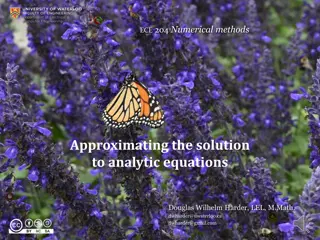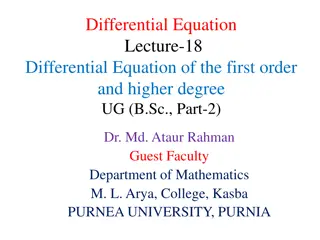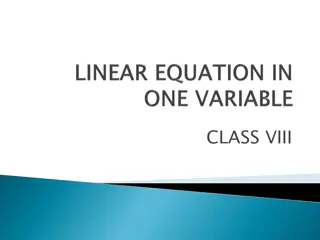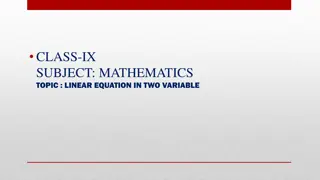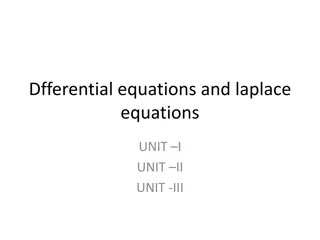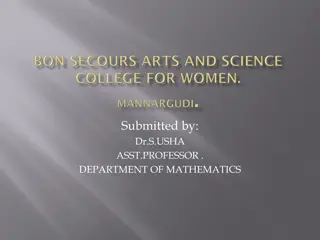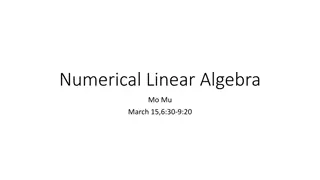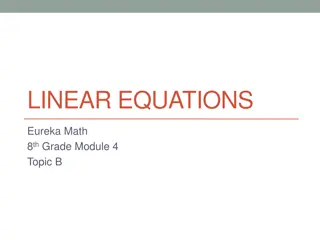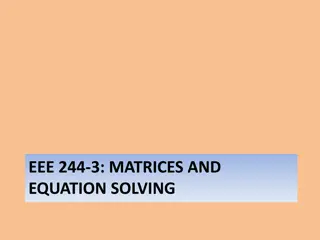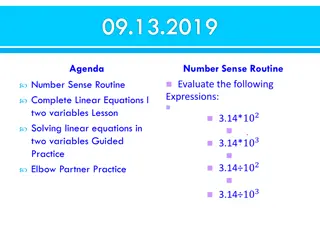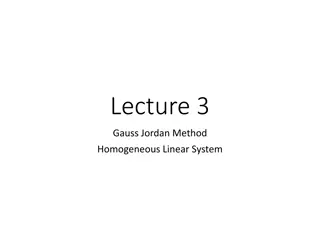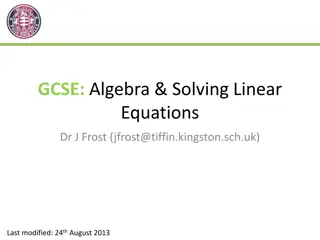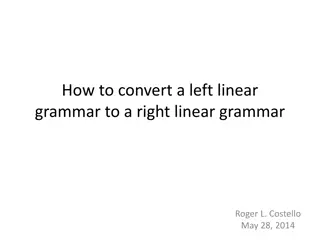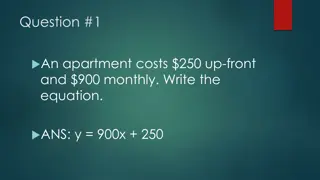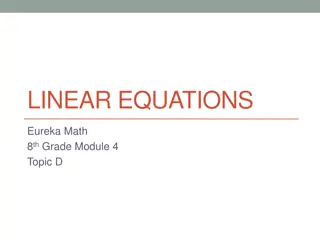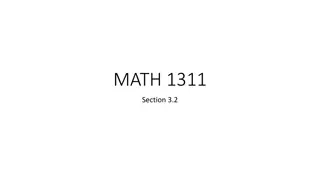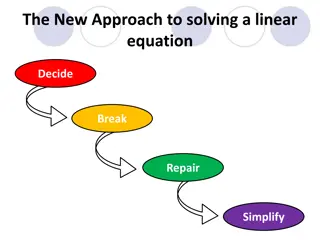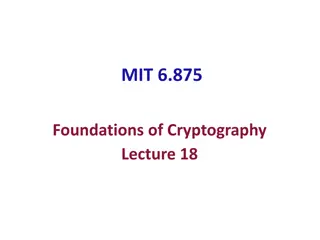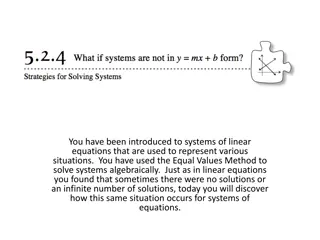Problem-Solving with Linear Equations
Learn how to create and solve equations from word problems involving linear equations. Follow six steps: define the unknown, determine operations, translate into an equation, solve by isolating the unknown, check the solution, and present the answer in sentence form. Step through examples of constructing and solving equations, such as finding a number based on given conditions and determining ages using algebraic equations. Understand the process of problem-solving with linear equations with detailed explanations and illustrations.
Download Presentation

Please find below an Image/Link to download the presentation.
The content on the website is provided AS IS for your information and personal use only. It may not be sold, licensed, or shared on other websites without obtaining consent from the author.If you encounter any issues during the download, it is possible that the publisher has removed the file from their server.
You are allowed to download the files provided on this website for personal or commercial use, subject to the condition that they are used lawfully. All files are the property of their respective owners.
The content on the website is provided AS IS for your information and personal use only. It may not be sold, licensed, or shared on other websites without obtaining consent from the author.
E N D
Presentation Transcript
18 February 2025 Problem solving using linear equations LO: To create equations from word problems in order to solve them. www.mathssupport.org
Problem solving with linear equations When problems are solved using algebra we follow these steps: Step 1 : Determine what the unknown quantity is and use a letter or symbol to represent it. Step 2 : Decide which operations are involved. Step 3 : Translate the problem into an equation. Step 4 : Solve the equation by isolating the unknown. Step 5 : Check that your solution satisfies the original problem. Step 6 : Write your answer in sentence form. www.mathssupport.org www.mathssupport.org
Constructing an equation Example 1 I m thinking of a number. When I subtract 9 from the number and double it, I get the same answer as dividing the number by 5. What number am I thinking of? Step 1 : Determine what the unknown quantity is and use a letter or symbol to represent it. The unknown is a number. Let s call the unknown number n. Step 2 : Decide which operations are involved. Step 3 : Translate the problem into an equation. n 5 n 9 = 2( ) Step 4 : Solve the equation by isolating the unknown. www.mathssupport.org
Solving the equation We can solve this equation by performing the same operations on both sides, 2(n 9) = n 5 10(n 9) = n 10n 90 = n multiply both side by 5: expand the bracket: 10n = n + 90 9n = 90 add 90 to both sides: subtract n from both sides: n = 10 divide both sides by 9: Step 5 : Check that your solution satisfies the original problem. We can check the solution by substituting it back into the original equation: 2 (10 9) = 10 5 2 (1) = `2 Step 6 : Write your answer in sentence form. So, the number is 10 www.mathssupport.org
Using equations to solve problems The sum of the ages of Ben and his daughter, Alice, is 66 years. In one year s time Ben will be three times Alice s age. How old is Alice now? Now a 66- a 1 year time a + 1 67- a Alice Ben Let s call current Alice s age a. Looking at the first piece of information both ages add up to 66 a + b = 66 66 a. we can write Ben s current age as In one year s time Ben s age will be three times Alice s age 67 a = 3(a + 1) www.mathssupport.org
Using equations to solve problems The sum of the ages of Ben and his daughter, Alice, is 66 years. In one year s time Ben will be three times Alice s age. How old is Alice now? 67 a = 3(a + 1) 67 a = 3a + 3 64 a = 3a 64 = a = 16 Solving the equation: Expand the brackets: subtract 3 from each side: add a to both sides: 4a divide both sides by 4: Alice is 16, so Ben is 50. In one year Alice will be 17 and Ben will be 51. 51 is three times 17, so our solution is correct. So, Alice s present age is 16 years www.mathssupport.org
Using equations to solve problems Carl has only 20 cent coins and 50 cent coins in his wallet. He has three more 50 cent coins than 20 cent coins, and their total value is $2.90. How many 20 cent coins does Carl have? Carl has 20 cent coins and 50 cents coins How many 20 cent coins he has? x If Carl has x, 20 cent coins then he has (x + 3) 50 cent coins Value 20x cents 50(x + 3) cents Coin Number x x + 3 20 cent 50 cent The total value of the coins is $2.90 or 290 cents 290 20x + 50(x + 3) = www.mathssupport.org
Using equations to solve problems Carl has only 20 cent coins and 50 cent coins in his wallet. He has three more 50 cent coins than 20 cent coins, and their total value is $2.90. How many 20 cent coins does Carl have? 290 20x + 50(x + 3) = 290 20x + 50x + 150 = Expand the brackets: 290 70x + 150 = Simplifying: subtract 150 from both sides: 140 70x = 2 x = divide both sides by 70: So, Carl has two 20 cent coins www.mathssupport.org
Using equations to solve problems Jim s Grandad Jim Grandad is 4 times older than Jim 15 60 Write an expression for the sum of their ages? To solve this problem, we need to start by letting Jim s age be something and then work out Grandad s age in terms of j: j say j 4j 4j The sum of their ages is + If their ages add up to 75 j + 4j = 75 5j = 75 j = 15 www.mathssupport.org
Using equations to solve problems Three friends have 200 game cards between them. Joe has more cards than Chris. Kay has more more 36 36 twice as many cards as Chris. twice as many cards as Chris. How many cards does each friend have? Let the number of cards which Chris has bex This means that: Kay has 2 x cards So, the total number of cards between them is: x + 36 cards x + 36 2 x Joe has This gives:4 x + 36 = 200 x + = 4 x + 36 + 4 x = 200 36 4x = 164 x = 41 So, Chris has 41 cards, Joe has 77 cards and Kay has 82 cards. www.mathssupport.org
Thank you for using resources from A close up of a cage Description automatically generated For more resources visit our website https://www.mathssupport.org If you have a special request, drop us an email info@mathssupport.org Get 20% off in your next purchase from our website, just use this code when checkout: MSUPPORT_20 www.mathssupport.org
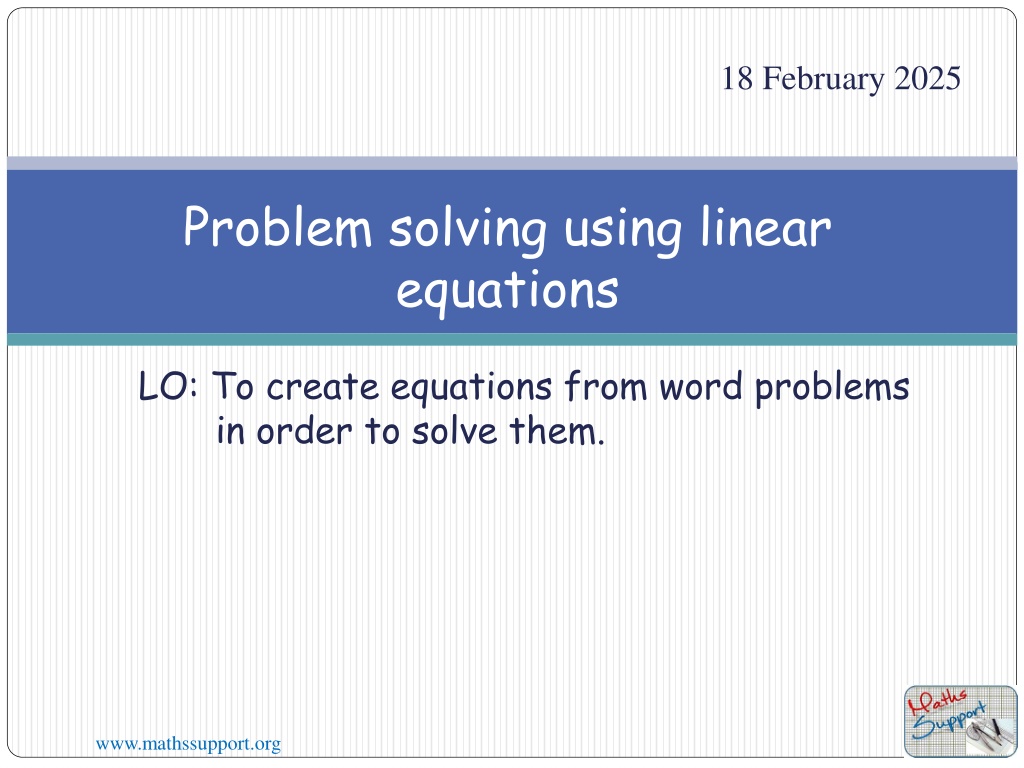
 undefined
undefined













